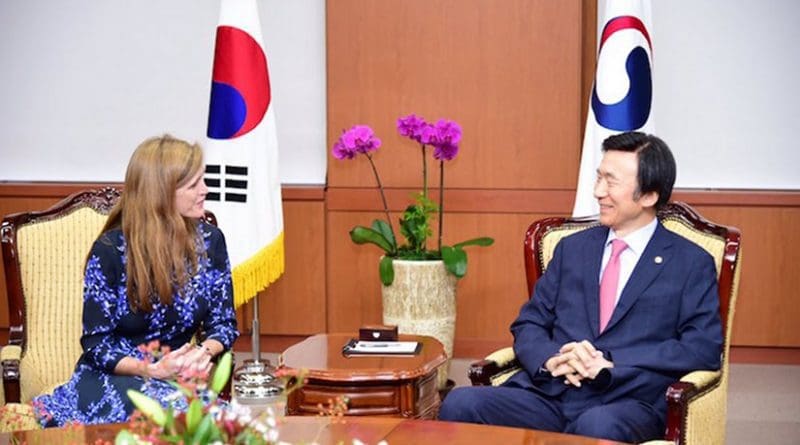US In High Level Talks On New Sanctions On North Korea
By IDN
By Rodney Reynolds
As a belated response to North Korea’s fifth nuclear test in September, the United States is in the process of negotiating a new Security Council resolution introducing additional economic sanctions while tightening existing ones.
But the final text of the resolution will depend on compromises demanded by China, a veto-wielding permanent member of the Security Council, which has remained a strong political supporter of the Democratic People’s Republic of Korea (DPRK).
Ambassador Samantha Power, U.S. Permanent Representative to the United Nations, told reporters, during a visit to South Korea October 10: “There are a set of political questions at the heart of any sanctions negotiation, but also a set of very, very technical issues, looking at the sources of hard currency for a regime that uses that currency in only one way, and that is to advance its destructive capabilities.”
“We are working around the clock to secure the passage of this resolution as quickly as possible,” she said. But she did not lay out a time frame.
“And even while I’ve been here (in South Korea), I have been in constant contact with my technical experts and lawyers and others who are working through the draft text with our Council colleagues back in New York.”
But Tariq Rauf, Director of the Stockholm International Peace Research Institute’s (SIPRI) Disarmament & Non-Proliferation Programme, challenged the U.S. decision to impose additional sanctions even as existing sanctions have not deterred North Korea from advancing its nuclear programme in defiance of Security Council resolutions.
“It seems that all efforts are being devoted to imposing ever harsher sanctions but diplomacy and negotiations with the DPRK are not being given equal priority.”
He told IDN there is no credible evidence of sanctions successfully resolving any nuclear non-proliferation crisis – nor have sanctions prevented the emergence of new nuclear-weapon possessing States.
The DPRK, India, Israel and Pakistan are vivid examples, he pointed out.
And the Joint Comprehensive Plan of Action (JCPOA) with Iran was achieved not solely on the basis of sanctions but also because of facts created on the ground by Iran (nearly 20,000 operating centrifuges and some 2,000 kg of enriched uranium), said Rauf, the former Head of Verification & Security Policy at the International Atomic Energy Agency (IAEA), who dealt with issues relating to DPRK, Iran, Iraq, Libya, and Syria at the Vienna-based UN agency.
Unfortunately, due to a lack and failure of diplomacy, Rauf argued, DPRK has created facts on the ground with six nuclear detonations over a decade (2006-2016) and multiple launches of ballistic missiles.
“In the waning days of the Obama administration, it is urgent that a new behind-the-scene diplomatic initiative is launched to focus on preliminary elements of a solution that could be carried forward by a new administration in Washington next year,” he declared.
According to the Washington-based Arms Control Association (ACA), the Security Council has adopted five major resolutions since 2006 that impose and strengthen sanctions on North Korea for continuing to develop its nuclear weapons program and called on Pyongyang to dismantle its nuclear program “in a complete, verifiable, and irreversible manner” and refrain from ballistic missile tests.
The first two resolutions were passed shortly after North Korean nuclear tests in 2006 and 2009. The third came a month after North Korea successfully launched a satellite in December 2012.
North Korea is prohibited from such launches under previous UN Security Council Resolutions because the technology in a satellite launch vehicle has potential dual use applications to ballistic missile development.
The fourth was passed after North Korea’s most recent nuclear test in February 2013. The most recent was adopted in March 2016 after a nuclear test and satellite launch early in the year.
The resolutions since 2009 furnished UN member states with interdiction authority, calling upon states to inspect North Korean cargo within their territory, and subsequently seize and dispose of goods prohibited by UNSC Resolutions, according to the ACA.
U.S. Ambassador Power told reporters in Seoul: “We are again very united – not for any old resolution. But for a resolution that makes a substantive difference and changes the calculus over time of the North Korean leadership.”
“So we are not going to sacrifice or short change our ambition to rush this out. We want this resolution to be practically impactful on the ground,” she cautioned.
And finally on China and Russia, Power said: “We have engaged at the highest level with the Chinese government.” She said U.S. President Barack Obama has spoken with President Xi about the importance of this resolution.
President Obama also spoke to Premier Li just a couple weeks earlier at the UN General Assembly, and “we will maintain and deepen our high-level contacts as we get to the end game of this negotiation”.
With regard to Russia or any country, she said: “We will exert all the political influence that we can on behalf of the strongest possible resolution, and just as I and my team have been working around the clock on this issue since the nuclear test itself, so too we will work around the clock to try and shore up support from all Council members.”

